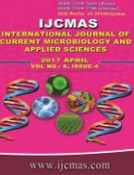


 National Academy of Agricultural Sciences (NAAS)
National Academy of Agricultural Sciences (NAAS)

|
PRINT ISSN : 2319-7692
Online ISSN : 2319-7706 Issues : 12 per year Publisher : Excellent Publishers Email : editorijcmas@gmail.com / submit@ijcmas.com Editor-in-chief: Dr.M.Prakash Index Copernicus ICV 2018: 95.39 NAAS RATING 2020: 5.38 |
This study was conducted to evaluate the effect of salinity on germination and emergence of chilli cultivars and to investigate the ability for genetic salt tolerance during germination and seedling growth. Although some of the chilli genotypes have salinity tolerance to some extent, more attention is required to assess the cultivars for salinity resistance/tolerance so as to screen them and select best types suitable to cultivate under areas prone to soil salinity. In the present study, germination percentage, vigour index, stress tolerant index, seedling length, seedling fresh weight and seedling dry weight were assayed at three salinity levels viz., 25mM NaCl, 50mM NaCl and 100mM NaCl and compared with control (0mM NaCl) on 14th day after sowing. It was found that when salinity concentration increased, the seedling growth decreased. When salt concentration increased, germination percentage of chilli seed was reduced and the time required to complete germination lengthened. Salt stress significantly decreased the shoot and root length, seedling height, seedling fresh and dry weight of chilli genotypes. Based on the results of the experiment, the varieties CO1, K1, Jayanthi, Arka Suphal and the accession EC467636 were found to be tolerant to salinity and could be used as genetic resources for developing saline tolerant hybrids.
 |
 |
 |
 |
 |